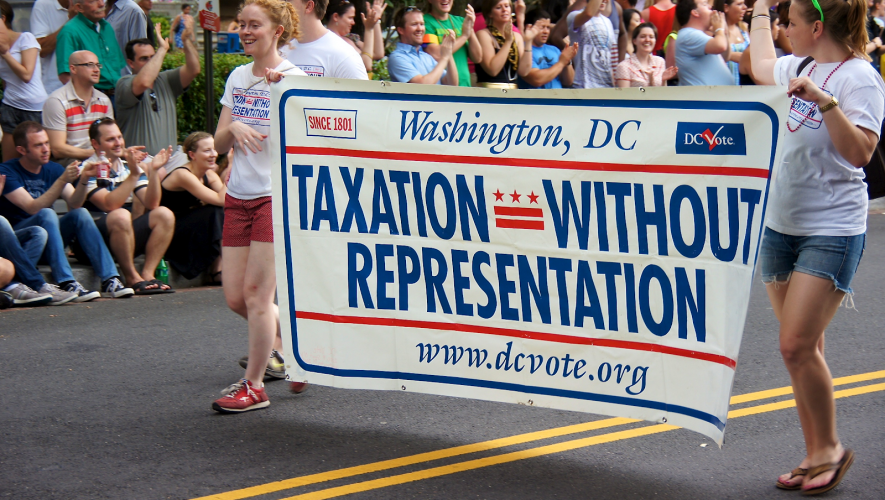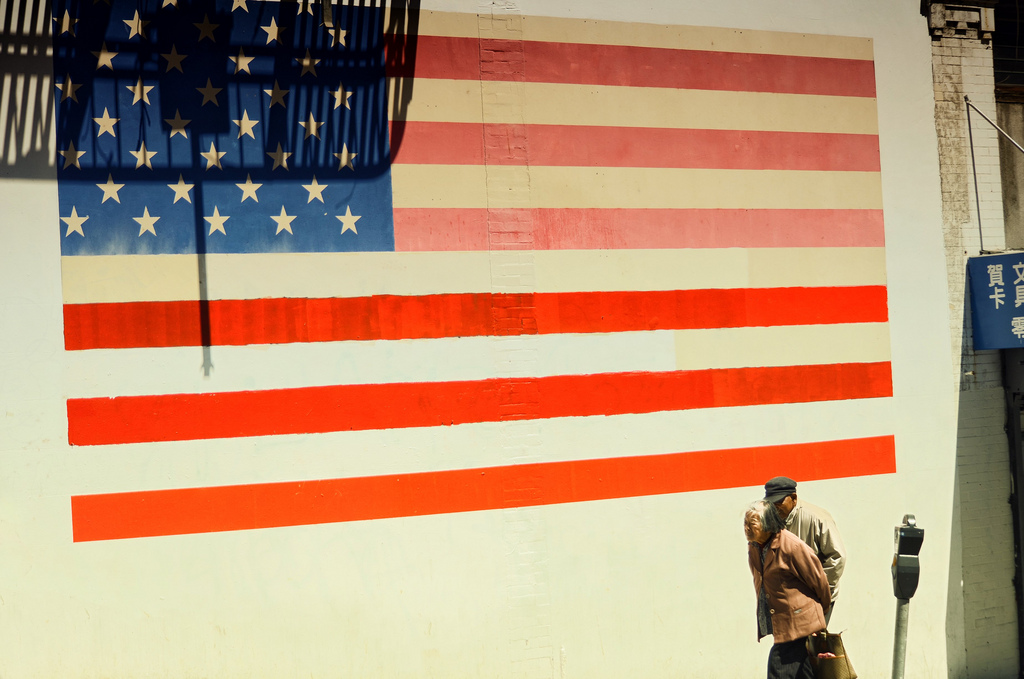It’s time to add a fifty-first star to the American flag.
As the capital city of the United States, Washington, DC, has historically been controlled by the federal government instead of its own residents. Article I of the Constitution grants Congress legislative authority over its seat of government. For most of the nineteenth century, DC enjoyed self-government that was tempered to varying degrees by presidential control. From 1874 to 1967, it was governed exclusively by a presidentially appointed board of commissioners. It wasn’t until 1973—more than fifty years after the Nineteenth Amendment (women’s suffrage) and almost a decade after the Voting Rights Act—that DC residents were finally allowed to vote for their own mayor and city council.
As of 2019, DC has a population of over seven hundred thousand—more than Wyoming and Vermont and similar to Alaska and North Dakota. These states have two seats in the Senate and one in the House. Though DC has a delegate to the House of Representatives, that member cannot vote.
The district couldn’t even vote in presidential elections until the passage of the Twenty-Third Amendment in 1961. The amendment granted DC electoral votes, which are normally distributed (roughly) based on population. However, DC is never permitted to have more electoral votes than the least populous state—so if its population grows, its representation won’t necessarily follow suit.
Before it takes effect, DC’s budget goes through a thirty-day review during which Congress can reject or change it—a requirement that is unique to the district. Thus, the city’s government depends on a Congress that the district has no voice in. Congressional control over DC invites partisan fights and federal bargaining that no other city is subject to.
“No taxation without representation,” the rallying cry of the American Revolution, doesn’t have a hold in the nation’s capital. DC residents, like all Americans, pay federal taxes. So, residents march with banners and display license plates which read “Taxation Without Representation.” If they have to pay the same taxes and follow the same laws as everyone else, DC residents should be granted the same rights and representation as all other Americans.
Support for DC statehood varies between residents of the district and the country as a whole. In 2016, 85 percent of DC voters approved a statehood proposal. In 2019, only 35 percent of all Americans supported the idea. But support grew to 43 percent the following year—likely due to Democratic presidential candidates’ support.
There are many reasons why Americans hesitate to support DC statehood. For one, the district is tiny—about seventy square miles, or one-seventeenth the size of the smallest state. But land mass should matter less than the people who live there and the importance of providing them representation. At about ten thousand residents per square mile, DC’s population density is ten times higher than the most densely populated state and one hundred times higher than the US as a whole. Over 700,000 Americans shouldn’t be denied representation because they live in a small area.
As is typical in America, racism could also be to blame. DC is 45 percent Black—a percentage higher than the Black population of any US state and almost four times higher than the US population. Granting DC statehood would mean guaranteeing congressional representation to hundreds of thousands of people from a historically disenfranchised voting bloc.
The district is also heavily Democratic—no Republican has ever won its electoral votes, and all of its mayors have been Democrats. As such, some may fear that statehood would grant Democrats two more votes in the Senate and one in the House. Republicans in Congress have little motivation to approve a statehood that would threaten their power, especially when the Senate’s structure already favors them.
The last time the House voted on legislation to make DC a state was in 1993; the bill failed with a vote of 153–277. But statehood advocates have not given up. In June 2020, DC Delegate Eleanor Holmes Norton got her statehood bill passed in the House with a 232–180 vote. The bill would establish a two-square-mile federal district separate from DC, thus ensuring that the federal government remains in an independent district. The rest of DC would be declared the state of Washington, Douglass Commonwealth, after Black abolitionist Frederick Douglass.
But like hundreds of other bills that year, HR 51 stalled in the Republican Senate and was never brought up for a vote.
However, Democrats now control Congress and the White House, and could bring DC statehood up for a vote. DC Mayor Muriel Bowser expressed optimism that a Democratic Senate majority would mean good things for DC statehood. House Speaker Nancy Pelosi supports the reintroduction of HR 51, and vowed to bring it up for another vote on the House floor. President Joe Biden endorsed DC statehood in 2015 and reaffirmed his support during the 2020 Democratic primary.
Senate Majority Leader Chuck Schumer backed the DC statehood bill last year, referring to the enfranchisement of DC voters as one of his “top priorities.” In October 2020, he said that he would like to make DC and Puerto Rico states if their residents wanted it. In the 2020 election, Puerto Ricans voted “yes” on statehood, but the majority was slimmer than DC’s, and people have raised questions about whether it’s better to grant the island statehood or independence.
With Democrats in control of the federal government, DC statehood could become a reality. Based on HR 51’s previous support in the House—over two hundred co-sponsors—it is likely to pass again. Senate Democrats reintroduced the bill on January 27, but it will be difficult to pass without a filibuster-proof majority; the bill would need support from every Democrat and at least ten Republicans. But at the very least, Democratic leaders have brought the issue up for a vote after McConnell refused.
If the bill were passed, DC statehood would likely be challenged in court. The Twenty-Third Amendment would also need to be repealed because it grants electoral votes to the district containing the seat of government. If DC became a state, the remaining two-square-mile district would wield three electoral votes despite having almost no voters.
The path to statehood is not easy, but the needs of DC residents are clear: no more taxation without representation. Grant the people of DC their right to representation in the House and the Senate. Allow them to break free of the federal government and exercise their political power as the residents of every state do.
Biden will have innumerable important issues cross his desk in the next few months. However, it is far past time for him and the rest of the Democratic Party to make good on their endorsements and finally grant DC the representation it deserves.



